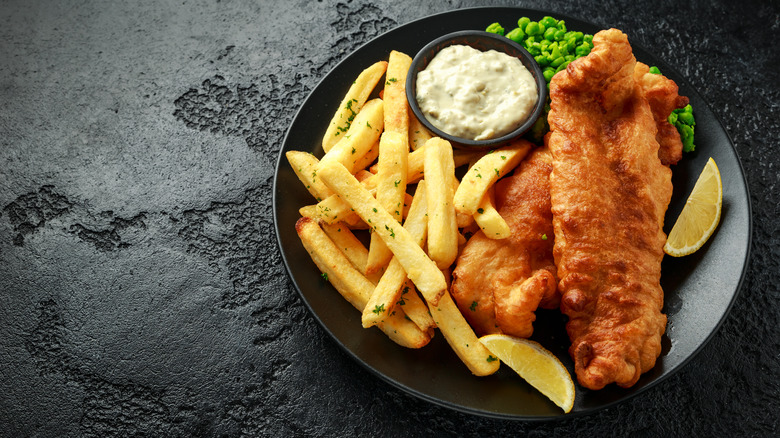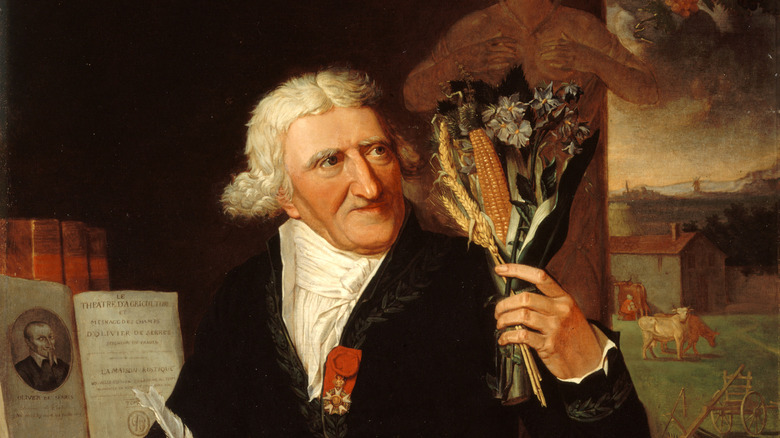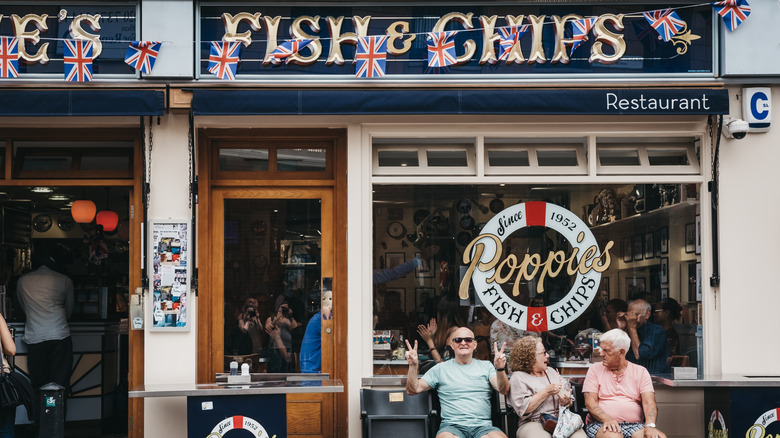The Origin Of Fish And Chips
Classic British cuisine runs the gamut from scotch eggs to cornish pastries to a hearty Sunday roast followed up by sticky toffee pudding. There is so much intrigue around quintessentially British foods that "mukbang" Youtube videos of English celebrities like Adele eating spotted dick and cockles and Florence Pugh chowing down on a full English breakfast to fish and chips have racked up millions and millions of views. Pugh even dives into an anecdote of her grandfather, a former fish dock worker, who takes his own piece of fish to "the chippy" that'll fry up the filet for him. After all, fish and chips are the "original British street food," according to the Street Food Guy, and are usually made of either cod — the most common fish — or haddock, rock, or skate and eaten with vinegar. Despite fish and chips being nearly synonymous with British culture, the origins of the dish, like many other foods, are the result of immigration.
Peshkado frito, the precursor to fish and chips
Centuries and centuries back, Sephardic Jews once lived peacefully in Portugal amongst other believers in faiths like Islam and Christianity, as reported on the Eat My Globe podcast. Peaceful coexistence was upended in 1496 when the king married Isabel of Spain, who then required a mandate that all Jews either convert to Christianity or be exiled from the country. Some fled, and others stayed but kept their faith secret until the Inquisition persecuted anyone with Jewish heritage, prompting some to flee to England to seek reprieve from religious persecution.
With the Sephardic Jewish arrival in England, they brought with them "peshkada frito," or fried fish, which was a favored dish to enjoy on Sabbath. Since no cooking is allowed on those days of rest, "allegedly, the batter preserved the fish so it could be eaten cold, and without sacrificing too much flavor, the following day," per Atlas Obscura. Fried fish, especially on Friday nights before Sabbath, quickly became a hit amongst the religious and non-religious alike.
How chips entered British cuisine
Though fried fish made an early entry into British cuisine, chips didn't appear until a bit later. While today, potatoes are commonly consumed in most cuisines around the world, they originate in South America and didn't find their way to Europe until around the beginning of the 16th century. Spanish colonizers brought the potato, tomatoes, avocado, and corn to Europe, and a French pharmacist named Antoine-Augustin Parmentier made the tuber popular by campaigning for an official statement that potatoes were safe to consume (via Atlas Obscura). Parmentier even penned an essay on how the humble potato could save a nation during times of famine, hosted dinners with influential figures like Thomas Jefferson, and made the potato a trendy fashion statement by asking Marie Antoinette to wear the purple flowers of potatoes with her extravagant outfits.
Thick-cut fried potatoes — chips, not to be confused with fries– then first made their appearance in 1854, sold by a tripe seller named Mrs. Duce, according to The Plate Unknown.
The pairing of fish and chips
Some food historians contend that one Jewish immigrant, Joseph Malin, opened England's first fish and chip shop opposite a pub called the Lady Franklin in 1860, remaining in business for over one hundred years, as reported by Roman Road London. One historian John Walton claimed that the first fish and chip shop actually popped up in Northern England in 1863, but later retracted his statement, leaving the title of the first fish and chip seller to Malin.
Either way, the combination of fish and chips proved to be a hit with the working class in the UK since it was a hearty, affordable, and nutritious meal. The explosion in popularity can be traced to the industrialization of England at the time, and to keep the street food cheap, newspapers were used as wrappers for the fish and chips. This eco-friendly practice of using yesterday's news as a vehicle for fried fish came to an end, however, due to health and safety concerns of ink seeping into your snack (via Child of the 1980s). Though fish and chips no longer come wrapped in newspaper, the dish remains a staple of British cuisine today, thanks to the waves of migration over the years.



